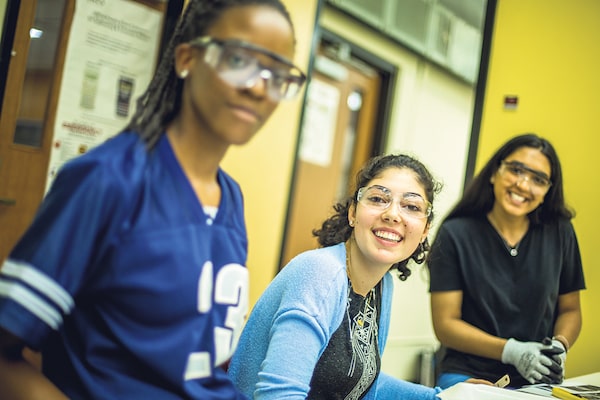
Concordia University’s Gina Cody School of Engineering and Computer Science is advancing diversity in engineering and computer science, one of the major challenges in the field.
Concordia University is up front about its commitment to gender diversity. The Montreal institution has made history by renaming its school of engineering and computer science for Gina Cody, the first woman ever to be awarded a PhD in building engineering there.
The recent change is just one way that Concordia is making efforts to bring the best minds to the profession, says Dr. Anjali Agarwal, associate dean of equity, diversity and inclusion at the Gina Cody School of Engineering and Computer Science.
“We are sending the message at Concordia that engineering and computer science are fields for everyone,” she says, including women, Indigenous peoples, members of the LGBTQ community and internationally educated professionals. “Ensuring groups currently underrepresented have a place in technology-based fields will bring balance to how problems are solved.”
Dr. Amir Asif, a professor of electrical and computer engineering who is founding dean of the Gina Cody School, says that achieving diversity in engineering and computer science is “one of the major challenges that the developed world is facing,” for example with women representing just 18 per cent of students in Canadian engineering programs.
Renaming the school came through a unanimous decision by faculty and students, he says, noting that Dr. Cody is “a perfect role model.” An immigrant to Canada, she arrived from Iran in 1979 with a few thousand dollars to her name, became the first woman awarded a PhD in building engineering from Concordia in 1989, and rose to become a highly successful engineer and entrepreneur at CCI Group.

Dr. Cody says she hopes that lending her name to the school will help break down barriers for women in engineering. She has also given it $15-million, the largest personal donation in Concordia’s history, which will be used for equity, diversity and inclusion initiatives, as well as to support programs at the school focused on disruptive technologies.
“My gift to the university is for the next generation, so that more people can succeed like I did,” she comments. “I want Concordia to be a place for women, people of colour, Indigenous populations and other minorities to pursue their dreams.”
It will take time to bring new perceptions of engineering into the world and into society. It has to happen from the bottom up.
— Dr. Anjali Agarwal, Associate dean of equity, diversity and inclusion at the Gina Cody School of Engineering and Computer Science
Dr. Agarwal, a professor of electrical and computer engineering, says that women in her native India have no trouble seeing themselves in science, technology, engineering and math, or STEM, jobs. “But there is a culture in Canada that if girls are interested in science, they go into medicine or health-related areas. They don’t see technology as a career.”
To counter this, women in the faculty have formed a committee to break down the barriers that currently prevent women from entering STEM fields. They run a free two-week summer technology camp at Concordia called GirlSET that gives young women in high school and Cégep hands-on experience in engineering, with fun and challenging activities from interactive labs to game development.

It’s critical to expose girls to the different engineering disciplines and how they can use engineering to address problems of daily living, such as developing prosthetics or inventing new types of green energy, Dr. Agarwal says. “Engineering can be technical and social.”
A student society called Women in Engineering organizes academic and outreach activities to promote STEM careers for young girls, starting in primary grades. The group’s co-presidents, Cynthia Ferullo and Serena Kullukian, both third-year industrial engineering students, say that it also provides networking opportunities and supportive events at the school for women as well as men.
Ms. Kullukian says that speakers’ programs, plant tours, workshops and alumni get-togethers highlight success among minorities and “eliminate stereotypes” that have proliferated in engineering. All students are “super proud” of the renaming of the school for Dr. Cody, adds Ms. Ferullo. “We’re breaking the stigma slowly, slowly, and this is a big step toward that.”

Noah Francis, a fourth-year software engineering student who is vice-president of Queer Engineers Concordia (QEC), says the school’s new name and support for initiatives like his group “gives a message to LGBTQ youths that there is a place for them in engineering.” He notes that diversity and inclusion encourage “different mindsets” in the profession.
“Race, cultural background, sexual orientation and gender identity influences who you are as an individual,” he says. “Bringing different perspectives into the problem-solving process will bring better and more ethical solutions.”
Dr. Agarwal wants to see “diversity in everything,” with more women hired as faculty or becoming chairs, and underrepresented groups coming into the school through scholarships and mentoring programs.
“It will take time to bring new perceptions of engineering into the world and into society,” she says. “It has to happen from the bottom up.”
Advertising feature produced by Globe Content Studio. The Globe’s editorial department was not involved.
Live your best. We have a daily Life & Arts newsletter, providing you with our latest stories on health, travel, food and culture. Sign up today.